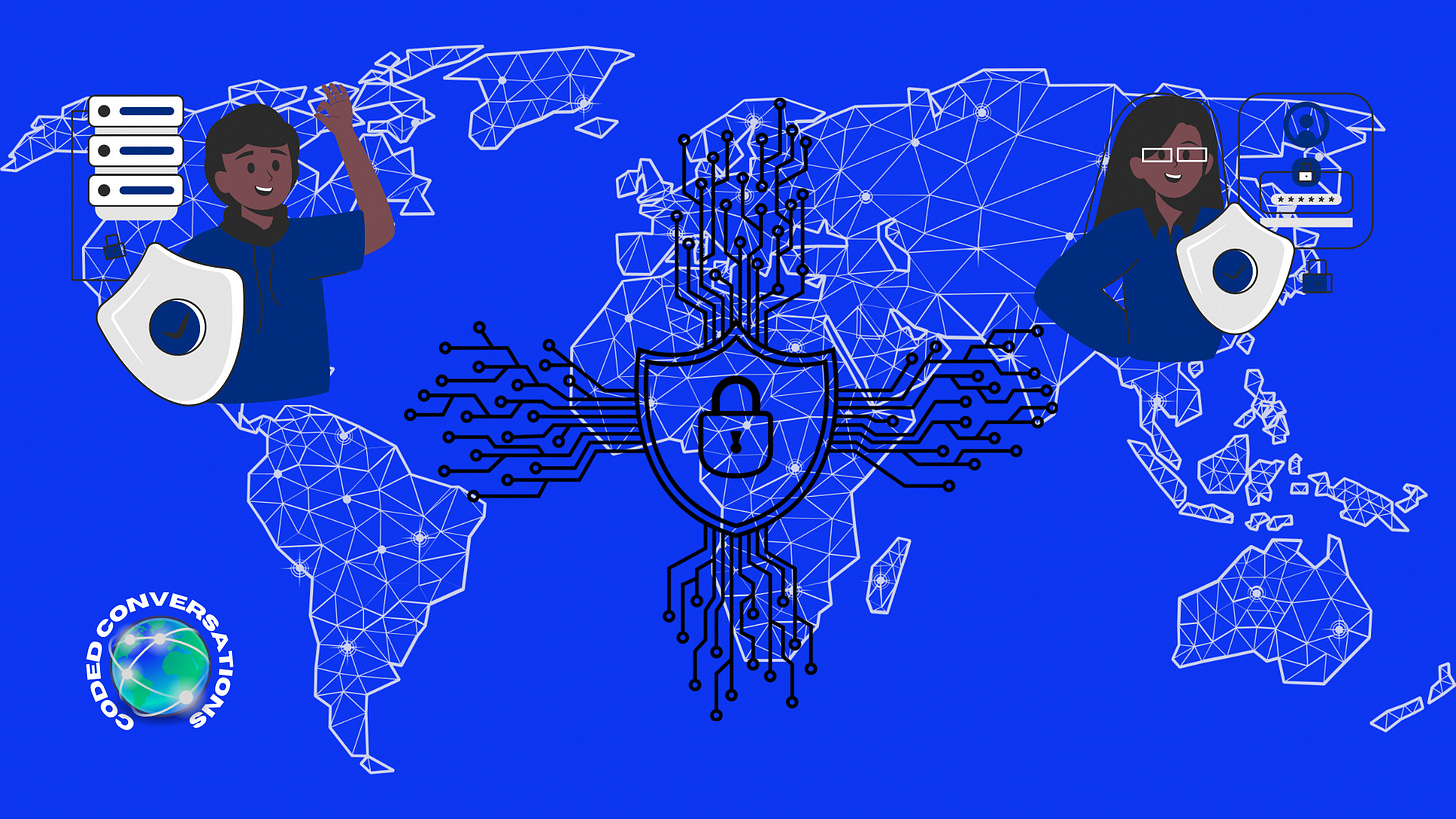Overview of Cybersecurity 🧑💻🗺️🛡️
1: Introduction and Fundamental Principles “Week 1: Introduction to Cybersecurity”
Cybersecurity, esteemed inquirer, embodies the confluence of methodologies, technologies, and practices dedicated to safeguarding computers, networks, programs, and data from unauthorized access, damage, or attack. It is a discipline grounded in the profound understanding of the aforementioned elements within the digital domain, ensuring the integrity, confidentiality, and availability of information. This realm demands a rigorous application of protective measures against a myriad of threats, including but not limited to cybercrime, espionage, and sabotage, thereby fortifying the digital infrastructure upon which modern civilization increasingly relies. In essence, cybersecurity is the bastion that stands vigilant against the adversities that threaten the sanctity of our digital world.
The elements encapsulated within your inquiry—ranging from the reception and comprehension of messages, to the acquisition of knowledge, the formal indictment of criminal activities, the aggregation of factual data, and the principles of communication theory—are foundational to the essence of cybersecurity for several pivotal reasons:
Comprehension of Messages: In the realm of cybersecurity, the ability to accurately receive and understand messages is crucial. This encompasses not only the literal interpretation of data but also the discernment of the subtleties within, such as detecting potential threats or vulnerabilities hidden within seemingly benign communications.
Acquisition of Knowledge: Cybersecurity is an ever-evolving field, necessitating continuous learning and adaptation. The knowledge derived from study, experience, and instruction forms the backbone of effective defense strategies, enabling practitioners to stay abreast of new threats and emerging technologies.
Formal Accusation of Crimes: Cybersecurity directly confronts cybercrime, necessitating a framework within which formal accusations can be made and prosecuted. This aspect underscores the legal and ethical dimensions of cybersecurity, where identifying, attributing, and taking legal action against malicious actors are critical components.
Collection of Facts: Data is the lifeblood of cybersecurity. The collection, analysis, and interpretation of facts enable the drawing of conclusions regarding the security posture of systems, the nature of threats faced, and the effectiveness of implemented defenses. This systematic gathering of information is foundational to informed decision-making and strategy formulation.
Communication Theory: Effective communication is paramount in cybersecurity, whether it's in the design of secure communication systems, the sharing of threat intelligence among entities, or the education of users about security best practices. Understanding the principles of communication theory aids in the development of robust security protocols and the efficient dissemination of critical information.
Cybersecurity significance, scope, and impact on modern society are profound and multifaceted, reflecting the pervasive integration of digital technologies into the fabric of daily life.
Significance:
Protection of Sensitive Information: Cybersecurity measures are crucial for safeguarding personal, corporate, and government information against theft and exploitation, including financial data, intellectual property, and personal identities.
Economic Security: The global economy increasingly relies on digital infrastructure. Cybersecurity protects businesses from financial loss due to cyber threats, ensuring operational continuity and consumer trust.
National Security: In the realm of national defense, cybersecurity is paramount. It defends against cyber espionage, terrorism, and warfare that target critical infrastructure and national interests.
Privacy Assurance: Cybersecurity upholds individual privacy rights by protecting personal data from unauthorized access and breaches, an increasingly important concern in an age of ubiquitous data collection.
Scope:
Network Security: Protecting network infrastructure and data transmitted across networks from unauthorized access, attacks, and disruptions.
Application Security: Ensuring that software applications are free from vulnerabilities that could be exploited by attackers, including web and mobile applications.
Endpoint Security: Securing computers, mobile devices, and other endpoints on a network, often involving antivirus software, firewalls, and intrusion prevention systems.
Data Security: Safeguarding data at rest and in transit through encryption, access controls, and data integrity measures.
Identity and Access Management (IAM): Controlling access to information systems and applications by ensuring only authorized users can access specific resources.
Cloud Security: Protecting data stored in cloud services, encompassing both the security of the cloud infrastructure and the data and applications that reside in the cloud.
Disaster Recovery and Business Continuity: Planning and implementing strategies to recover from security breaches, data loss, and system failures, ensuring that operations can continue with minimal disruption.
Impact on Modern Society:
Economic Impact: Cyber attacks can have devastating economic effects, from the direct costs of responding to breaches to the broader impacts on market confidence and international trade.
Social Impact: Cybersecurity breaches can lead to the loss of personal privacy, affect mental health due to identity theft or personal data exposure, and influence social dynamics through the spread of misinformation.
Political Impact: The integrity of democratic processes can be compromised through cyber interference in elections, while state-sponsored cyber activities can strain international relations.
Technological Innovation: The constant evolution of cyber threats drives technological innovation, leading to the development of more advanced and secure computing environments.
Legal and Regulatory Impact: Increasing cybersecurity threats have led to the implementation of stringent regulatory frameworks worldwide to protect data privacy and ensure corporate accountability.
Cybersecurity's significance transcends mere technical concerns, touching on economic stability, personal privacy, national security, and societal trust. As digital technologies continue to evolve and permeate more aspects of daily life, the role of cybersecurity in safeguarding the foundational structures of modern society becomes increasingly paramount.
Series: What is cybersecurity and why is it important?



